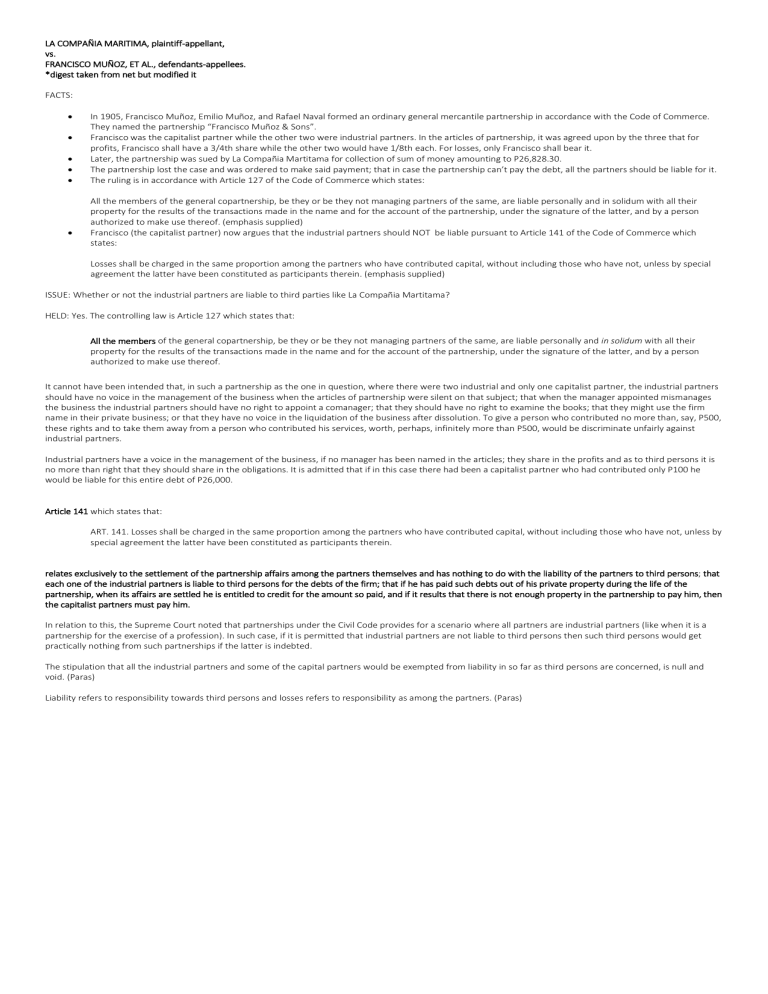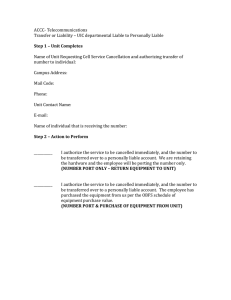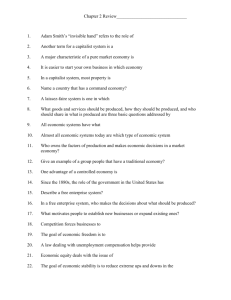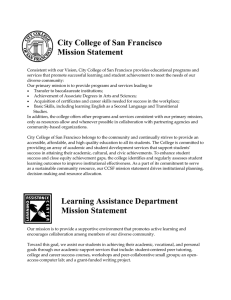
LA COMPAÑIA MARITIMA, plaintiff-appellant, vs. FRANCISCO MUÑOZ, ET AL., defendants-appellees. *digest taken from net but modified it FACTS: In 1905, Francisco Muñoz, Emilio Muñoz, and Rafael Naval formed an ordinary general mercantile partnership in accordance with the Code of Commerce. They named the partnership “Francisco Muñoz & Sons”. Francisco was the capitalist partner while the other two were industrial partners. In the articles of partnership, it was agreed upon by the three that for profits, Francisco shall have a 3/4th share while the other two would have 1/8th each. For losses, only Francisco shall bear it. Later, the partnership was sued by La Compañia Martitama for collection of sum of money amounting to P26,828.30. The partnership lost the case and was ordered to make said payment; that in case the partnership can’t pay the debt, all the partners should be liable for it. The ruling is in accordance with Article 127 of the Code of Commerce which states: All the members of the general copartnership, be they or be they not managing partners of the same, are liable personally and in solidum with all their property for the results of the transactions made in the name and for the account of the partnership, under the signature of the latter, and by a person authorized to make use thereof. (emphasis supplied) Francisco (the capitalist partner) now argues that the industrial partners should NOT be liable pursuant to Article 141 of the Code of Commerce which states: Losses shall be charged in the same proportion among the partners who have contributed capital, without including those who have not, unless by special agreement the latter have been constituted as participants therein. (emphasis supplied) ISSUE: Whether or not the industrial partners are liable to third parties like La Compañia Martitama? HELD: Yes. The controlling law is Article 127 which states that: All the members of the general copartnership, be they or be they not managing partners of the same, are liable personally and in solidum with all their property for the results of the transactions made in the name and for the account of the partnership, under the signature of the latter, and by a person authorized to make use thereof. It cannot have been intended that, in such a partnership as the one in question, where there were two industrial and only one capitalist partner, the industrial partners should have no voice in the management of the business when the articles of partnership were silent on that subject; that when the manager appointed mismanages the business the industrial partners should have no right to appoint a comanager; that they should have no right to examine the books; that they might use the firm name in their private business; or that they have no voice in the liquidation of the business after dissolution. To give a person who contributed no more than, say, P500, these rights and to take them away from a person who contributed his services, worth, perhaps, infinitely more than P500, would be discriminate unfairly against industrial partners. Industrial partners have a voice in the management of the business, if no manager has been named in the articles; they share in the profits and as to third persons it is no more than right that they should share in the obligations. It is admitted that if in this case there had been a capitalist partner who had contributed only P100 he would be liable for this entire debt of P26,000. Article 141 which states that: ART. 141. Losses shall be charged in the same proportion among the partners who have contributed capital, without including those who have not, unless by special agreement the latter have been constituted as participants therein. relates exclusively to the settlement of the partnership affairs among the partners themselves and has nothing to do with the liability of the partners to third persons; that each one of the industrial partners is liable to third persons for the debts of the firm; that if he has paid such debts out of his private property during the life of the partnership, when its affairs are settled he is entitled to credit for the amount so paid, and if it results that there is not enough property in the partnership to pay him, then the capitalist partners must pay him. In relation to this, the Supreme Court noted that partnerships under the Civil Code provides for a scenario where all partners are industrial partners (like when it is a partnership for the exercise of a profession). In such case, if it is permitted that industrial partners are not liable to third persons then such third persons would get practically nothing from such partnerships if the latter is indebted. The stipulation that all the industrial partners and some of the capital partners would be exempted from liability in so far as third persons are concerned, is null and void. (Paras) Liability refers to responsibility towards third persons and losses refers to responsibility as among the partners. (Paras)




